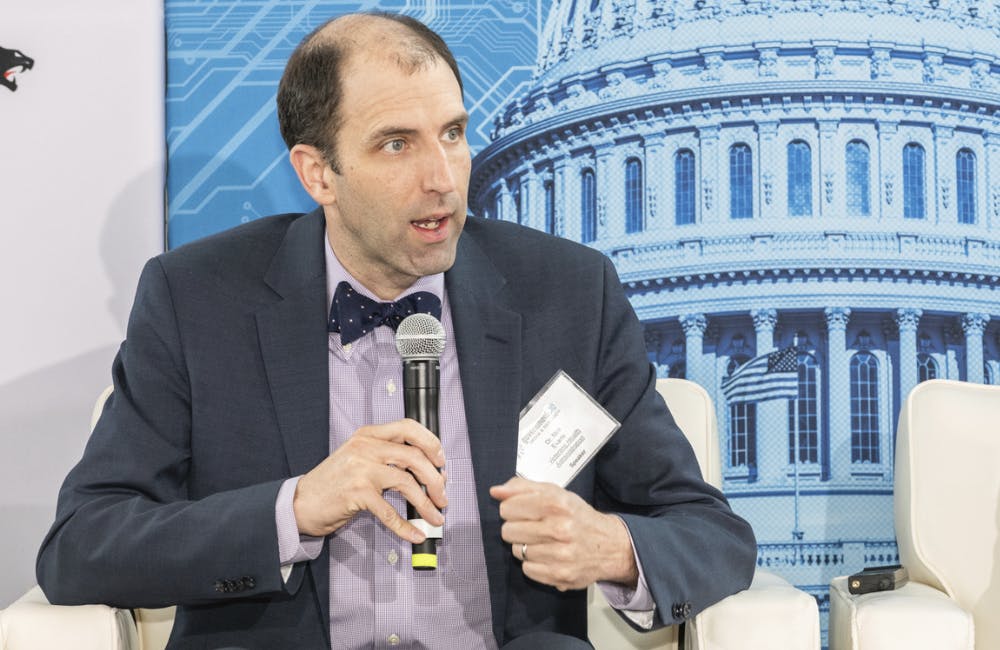Data Will Be Key to Combatting COVID-19 and Future Emergencies
Federal leaders emphasize the role of data in vaccine and treatment development, economic relief funding and contact tracing.

Federal CIO Suzette Kent and other leaders behind the Federal Data Strategy and COVID-19 public health response emphasized that leveraging data is critical to responding to the ongoing pandemic and are sharing instances in which data-driven methods and resources are aiding the nation in fighting the virus.
Kent — who helped draft the Federal Data Strategy, which guides agencies to leverage data as a strategic asset — said that objectives and action plan items of the strategy are not only key to advancing the missions of federal agencies, but also in the national response to COVID-19.
“The data that we’re using to drive change now is to save lives,” Kent said at Tuesday’s Tableau Government Summit 2020. “We’re using data to determine how we get life-saving medical equipment to those who are in need, to understand how a virus impacts our nation, to answer questions about individual health, community safety and our national economy. … Data is not only critical for our modernization journey and driving change. It’s critical for how we respond and how we recover as a nation.”
Kent underscored that the Federal Data Strategy’s 2020 action plan has set the path forward for agencies to establish protocol for rapidly sharing data across agencies and the public, as well as using data to make critical choices in the COVID-19 response.
“Right now, we are unified around many of those questions that have to be answered — questions like how we find a vaccine, driving visibility of the supply chain for medical equipment, understanding individual state and local situations,” Kent said. “Agencies are also using data to inform their decisions about how they return to an operational status as they assess specific workplace environments and create a working environment that’s safe for federal teams.”
Other federal officials who manage and implement the vision of the Federal Data Strategy further expanded upon the ways in which data and strategizing around it has bolstered various work in supporting the U.S. throughout the pandemic.
General Services Administration is one of them.
“Through the collaboration of the administration, federal agencies and the private sector, we have recently established a COVID-19 High Performance Computing Consortium, making the world’s most powerful and advanced computers available to fight COVID-19 to accelerate research using massive datasets,” said GSA Shared Solution and Performance Improvement Strategic Initiatives Program Manager Trey Bradley during Wednesday’s FCW Data & Analytics Workshop.
To emphasize the value of collaboration, Bradley touched on the COVID-19 Open Research Dataset (CORD-19), which is “the most extensive machine-readable coronavirus literature collection available today,” created in a private-public partnership among the National Library of Medicine, Allen Institute for AI, Chan Zuckerberg Initiative, Microsoft Research and the Georgetown Center for Security and Emerging Technology.
These efforts and emphasis on open data are not only key pillars of the Federal Data Strategy, Bradley and Kent said, but also they have enabled the fast turnaround of resources and information that drive vaccine, treatment and testing research and development.
Data has also aided the Small Business Administration in its loan and disaster aid to businesses amid the pandemic-stimulated economic shutdowns. SBA Enterprise Business Management Director Melvin Brown said that after organizing and visualizing COVID-19 response loan data, SBA was able to track information on where loan funds were distributed and find commonalities and themes in the relief data.
“Once we pushed out the COVID-19 data, we were able to see the geographic makeup of where the loans went, whether it was large banks, whether it was small banks, what part of the country was impacted the most,” Brown said. “We could start to see that and see those relationships so that we can make informed policy decisions about the next push.”
While data will help inform research and economic relief, it will also be key in contact tracing. Centers for Disease Control and Prevention Director Dr. Robert Redfield testified before senators in a Tuesday committee hearing that data and predictive analytics will be critical in overseeing the spread of the virus and aiding in contact-tracing efforts.
“CDC’s Emergency Operations Center is supporting state, tribal, local and territorial public health partners in building core capabilities, particularly workforce laboratory and data and predictive analytics,” Redfield said.
The CDC has contacts underway to expand data availability across the country to advance surveillance and contact tracing, which Redfield considered key to reopening the economy and loosening lockdown rules.
“To effectively respond to the public health challenges posed by the ongoing COVID-19 pandemic, this will be an expansive surveillance,” Redfield said. “Influenza and respiratory viral disease surveillance systems that have been combined with commercial and research lab platforms, in our case, reporting form systems — CDC’s adapting these and optimizing it to have a surveillance system in response to COVID-19.”
Demand for data across the COVID-19 response provides key insight into the needs U.S. public health infrastructure reform, Redfield said. Data, data analytics and added public health laboratory resilience are needed to act against COVID-19, Redfield said, and accelerating those modernization efforts now will benefit Americans during this and future public health emergencies.
This is a carousel with manually rotating slides. Use Next and Previous buttons to navigate or jump to a slide with the slide dots
-

Trump's Return to Office Sparks Focus on AI Infrastructure
A potential AI czar and prior AI executive orders lead to new considerations for R&D and energy infrastructure.
7m read -

VA Focuses on Continuous Improvement for 2025 EHR Rollout
VA plans to resume rollout of its EHR in FY 25, focusing recent feedback to drive continuous improvement amid the presidential transition.
4m read -

Trump's Intelligence Pick Backs Cybersecurity, Tech Accountability
The former congresswoman has called for improving cyber defenses and advocated for accountability in federal tech and data practices.
2m read -

Trump's Education Nominee Calls for Tech Vocational Programs
Linda McMahon has called for investments in the tech workforce and small businesses to remain competitive.
3m read








